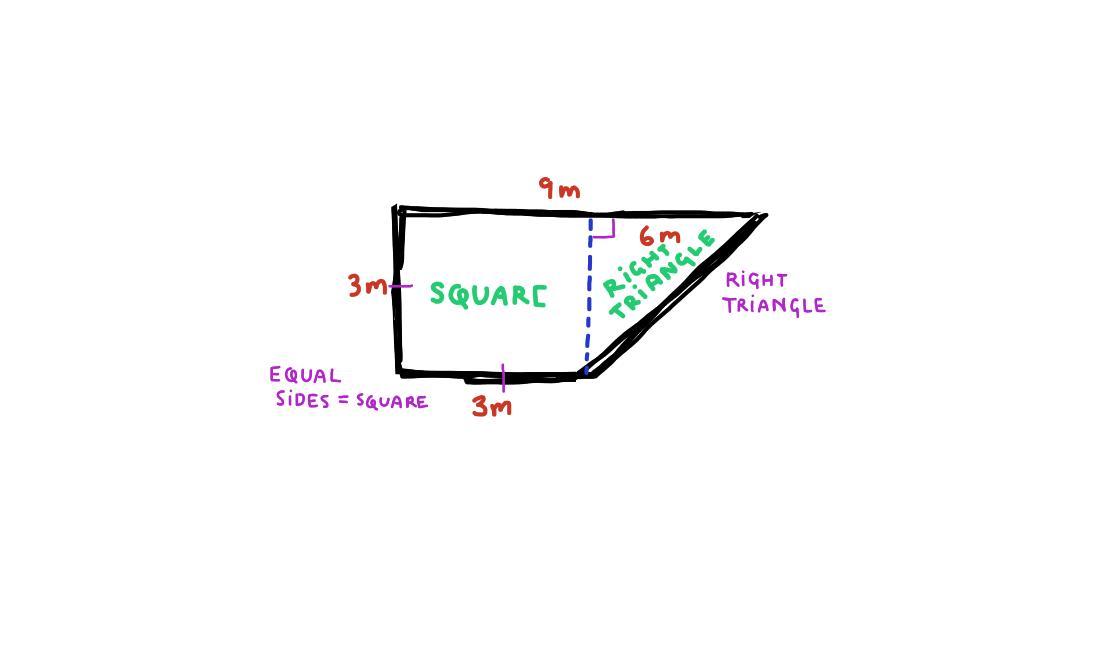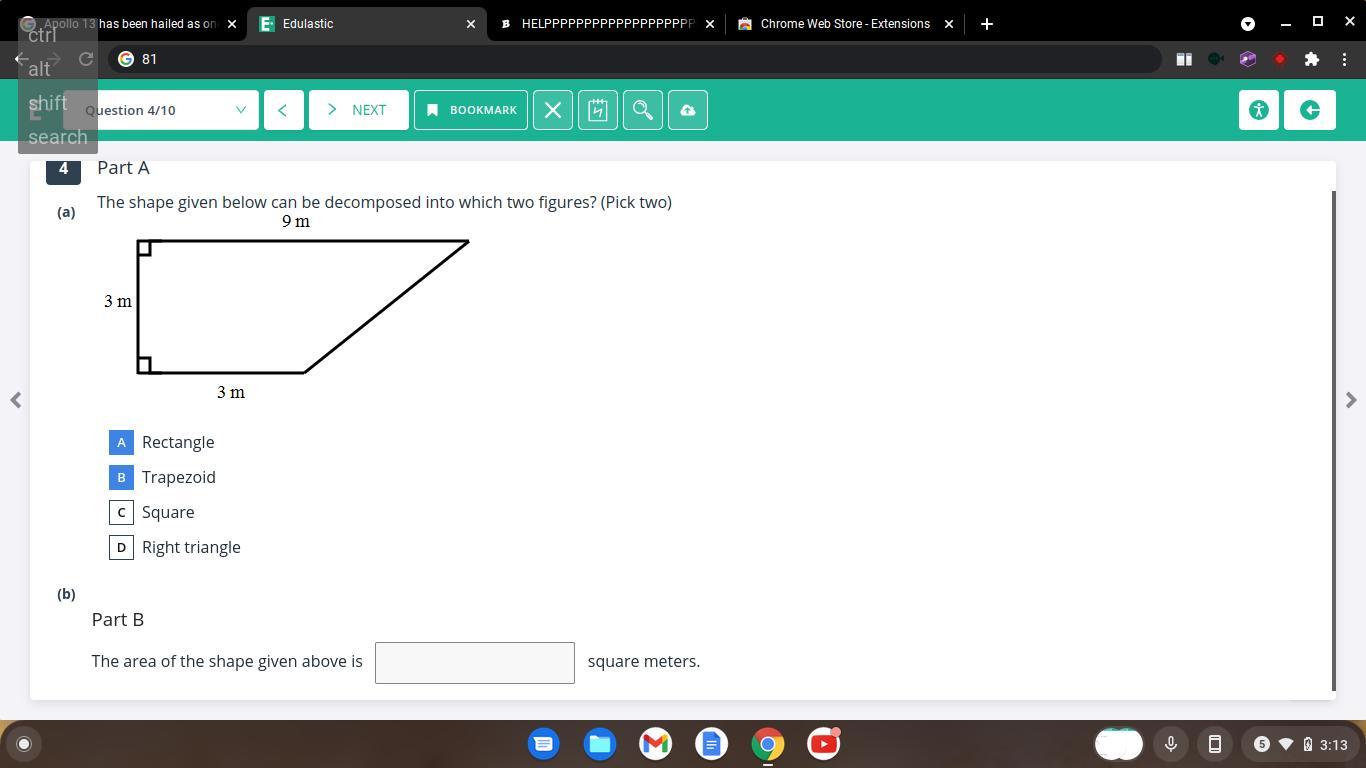Answers
Answer:
(Square, Right Triangle)
18 meters²
Step-by-step explanation:
You can divide the shape into a square and right triangle, see the attachment :)
The area of the square is the length times the width. So,
3 · 3 = 9
The area of the square is 9 m².
The triangle's area is the base times the height divided by 2. So,
6 · 3 = 18
18 / 2 = 9
The triangle has an area of 9 m².
Add these together.
9 + 9 = 18
The area is 18 meters².

Related Questions
What are the coordinates of point A?
Answers
Answer:
A . ( 1 , 2 )
hey! i’ll give brainliest please help!
Answers
Answer:
20
Step-by-step explanation:
Under Darius, the Persian Empire flourished. His most notable accomplishment was perfecting the system of government begun by Cyrus. The empire was divided into 20 satrapies, or provinces, each ruled over by a satrap.
What is the area of the composite shape?
cm
6 cm
5 cm
Answers
Answer:
40 cm
Step-by-step explanation:
Area of rectangle:
A = bh
A = 5(6)
A = 30
Area of triangle:
A = 0.5bh
A = 0.5(5)(4)
A = 2.5(4)
A = 10
Combined:
30 + 10
40
Jewan is setting up a monthly budget. His gross monthly income is $3125, but 20% is deducted for taxes. How much money is deducted in taxes, and how much is his monthly net pay?
Answers
Answer:
$625
$2500
Step-by-step explanation:
tax = percent of tax x income
0.2 x 3125 = 625
amount remaining = income - tax
3125 - 625
Find the value ot x to the nearest tenth. х 3 9 3
Answers
good luck :)))
Approximate the distance between (0, -5) and (4, 1) to the nearest tenth, if necessary.
Answers
Answer:
7.7
Step-by-step explanation:
To solve this question we must use Pythagoras (a²+b²=c²) Let those two dots be A and B respectively.Imagine a line is drawn that pases through both dots,
Imagine that the line given is the hypotenuse (the longest side of a right-angled triangle) of a right-angled triangle and the other sides as a line from A going to the right, and a line from B going downwards, making the final vertexes for the triangle at coordinates: 0,-5 4,1 and 4,-5 (the vertex we made). now we find the lengths for the sides: 4 and 6 so we use these to plug them into pythagoras's equation:
4²+6²=c²
24+36=c²
√60=c
c=7.74....
But all we need is until the tenths so the answer is 7.7 (as the hundredths digit, 4, rounds down)
find the coordinates of point p along the direct line segment ST so that SP to PT is 1 to 3. S= (-6,7) and T=(9,25)
Answers
Answer:
Step-by-step explanation:
the answer is 80
What is the shape of the cross section of the triangular prism in each situation? Drag and drop the answer into the box to match each situation.
Answers
Answer:
immma send you the link friend me on here
Step-by-step explanation:
Please factor using the x method
( please do not answer if you don't know how to do it )
Answers
Answer:
[tex]2(x - 5) ( 9x - 2)[/tex]
Step-by-step explanation:
((2•3^2x^2) - 94x) + 20
Pull like factors :
18x^2 - 94x + 20 = 2 • (9x^2 - 47x + 10)
Factor
9x^2 - 47x + 10
The first term is, 9x^2 its coefficient is 9.
The middle term is, -47x its coefficient is -47.
The last term, "the constant", is +10
Step-1: Multiply the coefficient of the first term by the constant 9 • 10 = 90
Step-2: Find two factors of 90 whose sum equals the coefficient of the middle term, which is -47.
-90 + -1 = -91
-45 + -2 = -47
Step-3: Rewrite the polynomial splitting the middle term using the two factors found in step 2 above, -45 and -2
9x^2 - 45x - 2x - 10
Step-4: Add up the first 2 terms, pulling out like factors :
9x • (x-5)
Add up the last 2 terms, pulling out common factors :
2 • (x-5)
Step-5: Add up the four terms of step 4 :
(9x-2) • (x-5)
Which is the desired factorization
thus the answer is
[tex]2(x - 5) ( 9x - 2)[/tex]
Answer:
Solution given:
18x²-94x+20
taking common
2(9x²-47x+10)
doing middle term factorization
90=45*2
2(9x²-45x-2x+10)
2(9x(x-5)-2(x-5))
2(9x-2)(x-5)
2(x-5)(9x-2)
Last one is a required answer.
Simplify:
3x2 – 2x + 1 = [?]
x=4
Answers
Answer:
look at the picture i sent........
Find the surface area of the regular pyramid.
PLS HELP ME
Answers
Answer:
The surface area equals 45.
simplify (√3+√2) ²
15 points
[tex] \sqrt{(3 + 2) ^{2} } [/tex]
Answers
Step-by-step explanation:
Given :-
(√3+√2)²√{(3+2)²}And we need to simplify the given numbers . We can use a identity in 1st Question as ,
[tex]\implies (a+b)^2=a^2+b^2+2ab[/tex]
Simplifying first :-
[tex]\implies (\sqrt3+\sqrt2)^2\\\\\implies (\sqrt3)^2+(\sqrt2)^2+2.\sqrt3.\sqrt2 \\\\\implies 3+2+2\sqrt6=\boxed{\red{5+\sqrt6 }}[/tex]
Simplifying second :-
[tex]\implies (3+2)^2\\\\\implies 5^2\\\\\implies \boxed{\red{25}}[/tex]
Tim earns $52.50 for 5 hours of dog walking. He earns the same amount
per hour each time he dog walks. How many hours does Tim need to dog
walk to earn $168?
Answers
What transformation has taken place
Answers
f(x) = x^2– 2x + 3; f(x) = –2x + 12
Answers
Answer:
yyyyyyyyyyyyyyyyyyyyyyyyyyyyyyyyyyyyyyyyyyyyyyyyyyyyyStep-by-step explanation:yyyyyyyyyyyyyyyyyyy
yyyyyyyyyyyyyyyyyyyyyyyyyyyyyyyyyyyyyyyyyyyyyyyyyyyyyyyyyyyyyyyyyyyyyyyyyyyyyyyyyyyyyyyyyyyyyyyyyyyyyyyy
ILL MARK BRAINIEST IF YOU CAN DO THIS RIGHT!!!
Answers
Answer:
G
Step-by-step explanation:
Because it is an equation
Solve the following expression when
x = 7 and y = 2
(y + 2). (x + 4 - 5)
Answers
4 and 23
Explanation:
P
E
M
D
A
S
please bootiful people help this nonsmart person
Answers
Answer:
9
Step-by-step explanation:
the triangle is right angle.
at right angle it makes 90°. therefore;
(3d+1)°+(6d+8)°=90°
3d+1°+6d+8°=90°
9d+9°=90°.
9d=90°-9°
9d=81°
d=81/9
d=9°
[tex]\frac{3}{4}-\frac{2}{3}[/tex]
Answers
So we’d have
9 - 8
———
12
1
—-
12
**PLEASE HELP**
Solve the following equation for g: 2(9 - h) = b + 4
Answers
the sum of 5 distinct prime numbers is an even number. which of the following is one of the 5 numbers in the sum?
Answers
Answer:
2
Step-by-step explanation:
One of them has to be 2. Two odd numbers added together make an even number. So you have two pairs of odd prime numbers and 2 must be the last one. If it is not then the sum will be odd.
Here's an example
3 + 5 + 7 + 11 = 26 which is even. If the next prime is odd, the whole sum will be odd.
26 + 17 = 43
However if the 5th number is two, then the sum of the 5 primes will be even.
26 + 2 = 28
Guys help me please
Answers
Answer:
A is correct option. Thanks
Tell me the statements that are true ?? Please and hurry ASAP DUE SOON
Answers
the diameter is found by the formula πr2
Suppose you drop a ball from 120 feet. The ball will bounce to 25 of its previous height. What is the total distance the ball travels from when you let it go to the max height it reaches after the 5th bounce? Round to the nearest tenth.
A) 268.7
B)273.9
C)277.1
D)279.3
Answers
Answer:
277.1 feets
Step-by-step explanation:
Drop height = 120 feets
Ball bounces 2/5 of previous height
Height after 1st bounce :
120 * 2/5 = 48 feets
Return distance = 48 feets
Height after second bounce :
48 * (2/5) = 19.2 feets
Return distance = 19.2 feets
Height after 3rd bounce :
19.2 * (2/5) = 7.68 feets
Return distance = 7.68 feets
Height after 4th bounce :
7.68 * (2/5) = 3.072 feets
Return distance = 3.072 feets
Height after 5th bounce :
3.072 * (2/5) = 1.2288 feets
(120 + (2*48) + (2*19.2) + (2*7.68) + (2*3.072) + 1.2288) = 277.1328
= 277.1 feets
Can anyone help me out
Answers
In ΔRST, r = 530 cm, s = 530 cm and t=950 cm. Find the measure of ∠T to the nearest 10th of a degree.
Answers
What is the coordinate of the focus
for the following parabola:
(x - 1)2 = 12(y + 2)
A. (1, -2)
B. (0, 12)
C. (12,0)
D. (1, 1)
Answers
Answer:
I want to say B or D please tell me if I'm right lol
In the data set below, what are the lower quartile, the median, and the upper quartile? 626676848497 lower quartile = median = upper quartile =
Answers
Answer:
Q1 = 4
Q2 = 7
Q3 = 42. 75
Step-by-step explanation:
Given the data:
626676848497
6, 2, 66, 7, 6, 8, 4, 8, 49, 7
Arrange in ascending order :
2, 4, 6, 6, 7, 7, 8, 8, 49, 66
The lower quartile (Q) :
1/4(n+1)th term
n = number of sample = 10
1/4(11)th term
2.75 term : (2 + 6) /2 = 8/2 = 4
Median :
1/2(n+1)th term
n = number of sample = 10
1/2(11)th term
5. 5 term : (7 + 7) /2 = 14/2 = 7
Upper quartile :
3/4(n+1)th term
3/4(11)th term
8.25 th term
3 /4 (8 + 49) = 42.75
What is the answer?????
Answers
Answer:
5/12
5 balloons were yellow out of the 12
Plzzz help me!
Anthony invested $1000 in a savings account at 2% simple interest. He invested the money for 4 years.
What is the total amount Anthony will have at 4 years?
Answers
Answer:
80
Step-by-step explanation:
find 2 percent of 1000 and times it by 4 the amount of years
Answer:
$1082.43
Step-by-step explanation:
You use the interest formula.
P(1+r/n)^nt
Then plug it in
1000(1+.02)^4
Which comes out to 1082.43
Hope this helps
Brainliest would be appreciated
